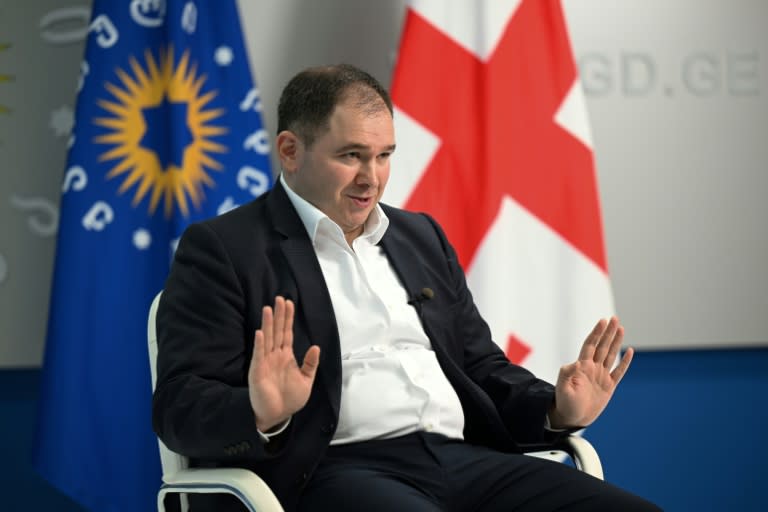Georgia PM says copycat Russian law to be passed amid protests

- Oops!Something went wrong.Please try again later.
Georgia's prime minister on Monday vowed to ram controversial "foreign influence" legislation through parliament the next day despite mass protests against the law criticised for mirroring repressive Russian legislation.
His comments came as thousands of young Georgians crowded outside parliament for a third straight night of protests against the bill that has split the Caucasus country and triggered international condemnation.
A month of tensions over the bill that has been dubbed the "Russian law" by its critics is approaching a critical point, with Prime Minister Irakli Kobakhidze confirming lawmakers would pass the bill on Tuesday.
"Tomorrow the parliament of Georgia will act on the will of the majority of the population and pass the law in the third reading," he said in a televised address, even as protesters gathered outside parliament.
He warned that if authorities backed down, Georgia would lose sovereignty and "easily share the fate of Ukraine", although it was not immediately clear what he meant by that.
The prime minister also said that if the bill was dropped then protesters would next force the government to back down on other issues -- such as "same-sex legalisation" and "uncontrolled immigration".
The Georgian capital Tbilisi has been gripped by its largest street protests in years, ever since authorities in April revived plans that were shelved a year ago after a similar wave of rallies.
Georgian students announced a strike on Monday and marched along Tbilisi's main Rustaveli Avenue to parliament later in the evening, many bearing EU and Georgian flags.
Opponents say that passing the law would sabotage Georgia's hopes of joining the European Union, and accuse the ruling party of moving the Black Sea nation closer to Moscow.
- Police crowd Tbilisi -
Sofi Kochoradze, 27, told AFP that protesters would "stay here until we achieve our goals".
"We know what happened in Russia and Belarus," she added. "We don't want it to happen here."
Another attendee, 21-year-old teacher Elene Raukh, said she had attended the previous night's protests until 4am, before going to work and returning for Monday night's demonstrations.
"I am exhausted as I had two hours of sleep," she said, sitting on the floor near parliament with her friends. "But I can't stay at home right now."
"I will stay until I can't stand anymore," she said.
Police were out in force on Monday, guarding the building.
Earlier in the day, protesters tried to block ruling Georgian Dream MPs from entering parliament.
The lawmakers managed to access the building from the back and pushed the bill through a parliamentary legal committee -- needed before a legislative vote -- in less than two minutes.
The law requires advocacy groups and media outlets that receive more than 20 percent of their funding from abroad to register as an organisation "pursuing the interests of a foreign power".
Russia has used a similar law to stifle dissent, targeting independent NGOs, journalists and political opponents.
Georgian Dream MP Nikoloz Samkharadze hit out at the outrage over the law in an interview with AFP on Monday, saying it has "nothing to do with the Russian" version.
He also insisted Georgian Dream was committed to European integration.
Protesters, the opposition, the EU and international rights groups have decried the law as undemocratic and Brussels has indicated it is not compatible with membership of the bloc.
- 'As long as it takes' -
Outside parliament, the mood was unpredictable, with riot police crowded in one street behind parliament, and protesters appearing defiant.
"We are planning to stay here for as long as it takes," 22-year-old Mariam Karlandadze told AFP.
AFP journalists saw hundreds of riot police lining a street behind parliament, where security forces had carried out detentions at dawn.
Georgia later opened a probe into the abuse of police power after the EU -- which granted Tbilisi candidate status last year -- urged an investigation.
The interior minister said police had arrested 20 people, including a Russian and two Americans, at night.
Georgian Dream -- in power since 2012 -- has defended the law as necessary for the country's sovereignty.
Its billionaire backer Bidzina Ivanishvili, who made his fortune in Russia, has accused NGOs of plotting a revolution and being foreign puppets.
He has been accused of leaning towards Moscow and has not publicly condemned the Kremlin's invasion of Ukraine.
Many protesters see the bill as a symbol of their government's wider drift towards Moscow, with some wearing Ukrainian flags at rallies and urging Tbilisi to be more vocal about supporting Kyiv.
oc-jbr/rox/bc

